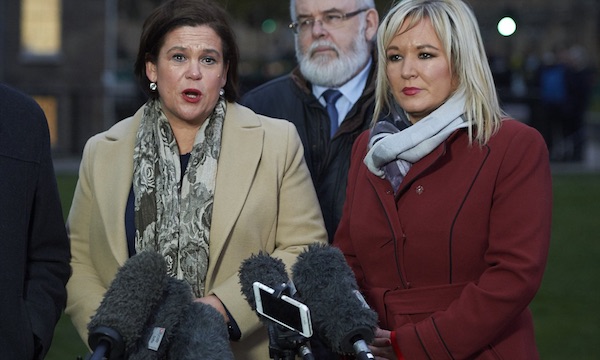
Details of a draft talks agreement on the restoration of powersharing between Sinn Fein and the DUP have exposed the opposition of powerful unionist hardliners to even the most moderate accommodation with nationalism.
Negotiations between the two parties on restoring the Stormont Assembly and Executive after a year long stalemate ended suddenly last week after senior party figures rejected outright a deal which would have brought equality measures for Irish language speakers.
A compromise for a proposed Irish language Act to be just one element of an overall package on diversity, in parallel with protections for the Ulster Scots dialect, was not enough to win over powerful DUP figures with an abiding hate for the Gaelic tongue.
A leaked 13-page draft document revealed there had been an agreement with DUP negotiators on three language/culture bills, with other outstanding issues to be dealt with by reviews, or resolved separately by the British government.
Despite the document showing few and mainly presentational items in dispute, the DUP has insisted there was no agreement whatsoever. Sinn Fein and the Dublin government were certain, however, that an accommodation had been reached. Sinn Fein accused the DUP of “walking away” from the deal.
The DUP has shown little interest so far in a resumption of talks, and there is concern that the party is content to dig in against political change while it holds the crucial balance of power at Westminster.
Speaking following a meeting with Taoiseach Leo Varadkar and Tanaiste Simon Coveney, new Sinn Fein leader Mary Lou McDonald said the return of full Direct Rule from London “is not an option”.
“Over the past 13 months, Sinn Fein has been engaged in negotiations to implement previous agreements, secure the rights of citizens and re-establish the power sharing Executive on the basis of equality and respect,” she said.
“We reached a draft agreement with the DUP leadership. We were disappointed that the DUP walked away from that draft agreement and ended the talks process.
“We cannot allow a political vacuum to develop or tolerate the continued denial of rights of citizens.”
She said the two governments “must now act” by organising a meeting of the British-Irish Intergovernmental Conference “as a matter of urgency” and move to implement outstanding previous agreements.
“These include an Irish Language Act, the release of funds for legacy inquests and progress the legacy mechanisms, as well as safeguarding the rights of citizens including the right to marriage equality.”
Senior DUP figures, including party leader Arlene Foster, have made contradictory statements about the negotiations process. Former health minister Edwin Poots said he helped write the draft agreement on Irish, while his party colleague Gregory Campbell MP denied it existed.
In defiance of the leaked text, Mrs Foster later declared: “We were not contemplating bringing in an Irish language act and I could not be clearer in relation to that.
“If you look at the so-called draft agreement that is only one of a number of documents that were circulated and put out and about, and I think the important thing is that we now reflect on where we got to in relation to all of those issues, we have a budget put in place, I think that is important for the people of Northern Ireland and that we move forward.”
McDONALD MEETS MAY
The SDLP’s Colum Eastwood called for the draft agreement to be implemented by legislation at Westminster.
After meeting with Theresa May at the House of Commons on Wednesday following her first meeting with the British PM since she took over from Gerry Adams, Ms McDonald warned the British government had no viable plan for restoring the power-sharing institutions.
She said she feared “entrenchment and drift” and accused Mrs May’s government of engaging in a period of reflection which could create a dangerous political vacuum.
“The [British] government does not have a plan, there is not a viable plan for carving a path to the restoration of the institutions,” the new Sinn Fein leader said.
“We tried to impress upon the prime minister and secretary of state that standing still and doing nothing is simply not an option.
“Just because the DUP have crashed the bus, does not mean that everyone has to sit at home now and cross their fingers and hope against hope that things will improve and that these issues will be resolved.”
She said instigating a period of reflection, as proposed by London, was not the way to treat the electorate in the Six Counties, which has been without an assembly for 13 months after four rounds of talks resulted in failure.
She said May’s deal with the DUP at Westminster, in which the unionist party MPs give the Tories a working majority, has undermined confidence in the British government’s role in resolving the crisis.
“It robs even the pretence of impartiality in the minds of many; and I do have a concern, and I shared this with Theresa May, that she might soft-pedal, that she might put things off, in order to protect that arrangement,” she said.
“The other thing about the confidence and supply arrangement was the commitment to the Tories on Brexit.
“It’s not her words, it’s her actions: we’ve had words until we’ve nearly given each other migraines. In the final analysis, to get this sorted out, you can only judge and make a call when the words are silent and when you look to the actions.”
![[Irish Republican News]](https://republican-news.org/graphics/title_gifs/rn.gif)
![[Irish Republican News]](https://republican-news.org/graphics/title_gifs/harp.gif)

